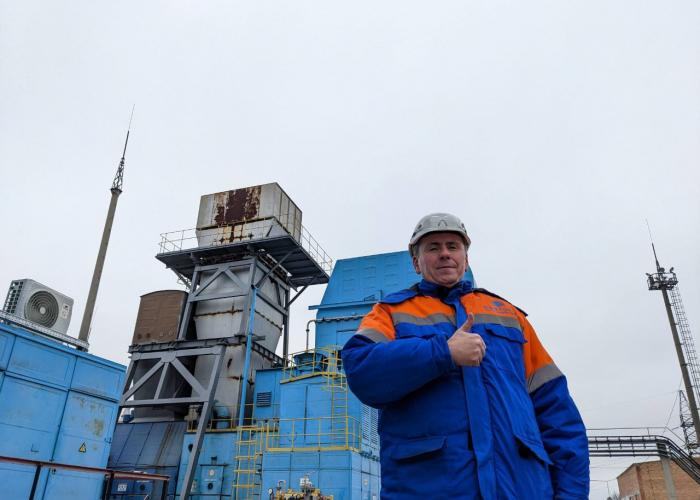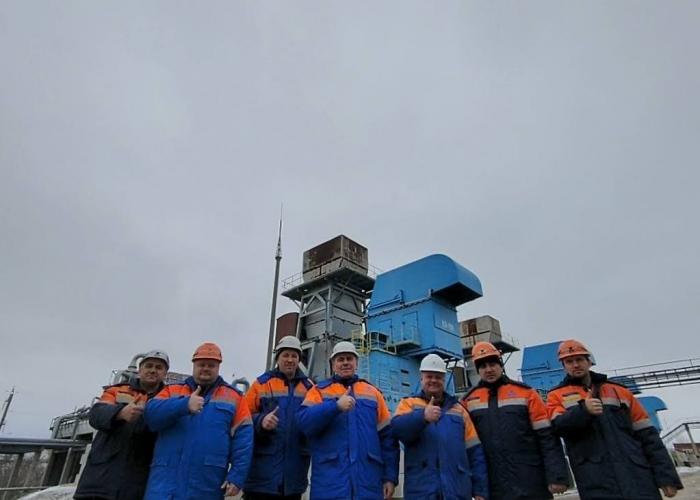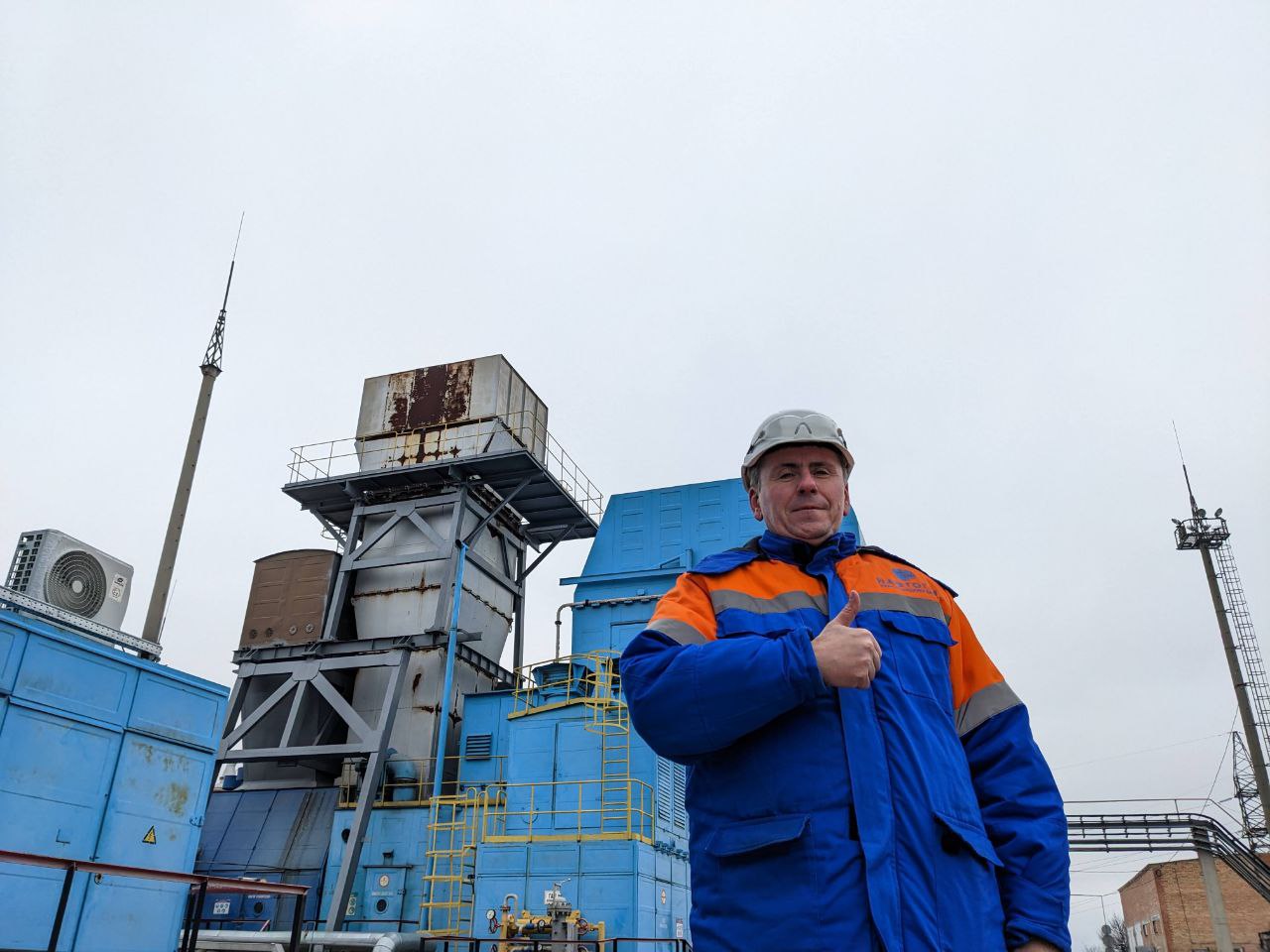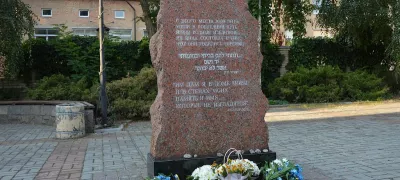


As soon as Ukrainians, and indeed the whole world, called the Ukrainian winter of 2022-2023: strategic, the most challenging, and the coldest, it was indeed so. But the most important thing is that we endured and didn't freeze. We asked the workers on the energy front lines about their thoughts and what this winter was like for them. One of the representatives of this sector in Poltava shared his experiences. Alexander Ostapenko, the head of one of the oil and gas enterprises under the Poltava Regional Department of the State Emergency Service of Ukraine, responded to journalists' questions:
**The first days of the war - The first thought on the morning of February 24th was concern for my family. My daughter is in Kharkiv, and she was the first to call. She said she was in a relatively safe place. After that, I called other relatives. The television was on, and they were reporting that it wasn't just a provocation but a full-scale invasion. I realized that I needed to gather myself and go to work, where the team was waiting. We couldn't spread panic; on the contrary, we needed to reassure people and continue our work. We are part of the critical infrastructure of independent Ukraine, and the process in which we participate must be uninterrupted, 24/7. I didn't see panic in the eyes of my employees. It was quite scary only on February 24th, the first day. But then, I realized that Russia wouldn't be able to defeat such a brave country as Ukraine. When I came to work on February 24th, people were puzzled and somewhat scared, but I didn't see panic. Everyone came to work, no one refused, no one said, 'I'm going home because of the war.' People were very united. I asked women to go home because there was a threat. On February 25-26, tanks appeared in the Sumy region, near the border with Poltava, and there were battles near one of our facilities. The situation was really dangerous, so I turned to the female workforce, but the women refused. We optimized our work as quickly as possible. Like all over the country, not just in our company. People who weren't directly involved in oil, gas, and gas condensate production were sent to remote work, leaving only those employees who had to be at the production site. We have a bomb shelter on our site, and during air raids, we would go there. When the explosions subsided, we continued the work process. So, we didn't have any casualties or injuries. This also depended on the coordinated work, clear tasks set for us, and our precise execution.
In the front-line zone, during the first days of the invasion, there were combat actions on the border between Poltava and Sumy regions. One of the facilities of Poltava Regional Department of the State Emergency Service of Ukraine, Poltavagazvydobuvannia, was located nearby. According to Alexander, this facility likely didn't interest the aggressors, and they probably just got lost because Ukrainians had removed the names of settlements, making it very difficult for the enemy to navigate.
"It was a small facility, our people were there, and they were in danger. However, the workers didn't abandon their jobs. They saw enemy tanks, observed them, and reported this information to the relevant Ukrainian Armed Forces units. Our people engaged in this sort of 'intelligence work.' It was impossible to replace them. So, they stayed at the facility for 3-4 days, ensuring uninterrupted operation. As soon as the opportunity arose, food and a new shift were brought there. The enemy tanks continued to roam in the forests, where the local residents and our employees guided the special services and Ukrainian Armed Forces to eliminate this threat," Alexander explained.
Regarding the impact of the war on gas production in Poltava, according to the head of the workshop, the volumes of hydrocarbons extracted in 2021 and 2022 remained almost at the same level. However, Alexander assesses the prospects as positive:
"I believe that the prospects are even brighter now than before the war. For our workshop, 6 wells have already been drilled and await connection. I think that in the near future, 2 of them will be put into operation, and we will return to the level we had before the invasion. Several wells are also in drilling or undergoing major repairs, and I cautiously predict that today the prospects for Poltavagazvydobuvannia are quite optimistic. I say 'cautiously' because not everything depends on us. We explore, drill, operate, but there is a lot of auxiliary equipment, the production of which has slowed down a bit, spare parts, and other equipment that we need – there may be questions about procurement and delivery times."
Regarding whether the "gas workers" were afraid of the winter of 2022-2023, Alexander mentioned that in terms of actual gas supply, they had enough for the winter, and they were confident about providing hot water for heating. However, they were concerned about the delivery of gas to heating plants and facilities because this process involved many organizations responsible for delivering gas to boilers and batteries. If any link in this chain failed due to enemy airstrikes, it could have led to problems similar to those in Alchevsk.
"We were concerned about that. Also, there are newly built micro-districts where heating comes from a single boiler room. What if something happened there during -20°C? The boiler room would shut down, and there would be no heat through the pipelines. So, that's what we were worried about. But we made it through. When the Russians concentrated their attacks on critical infrastructure objects in the fall, many efforts were made at enterprises to protect facilities with fortifications," Alexander explained.
"We used concrete blocks and sandbags to protect vulnerable energy equipment from partial damage caused by shrapnel and debris. Even indirect hits on expensive transformers can cause significant damage. We also built shelters for people at all facilities in our workshop so that they could go down and stay in a safe place comfortably during alarms. This was done at all Poltavagazvydobuvannia facilities," he added.
Regarding the depletion of Ukrainian gas reserves, Alexander mentioned that today, Ukrainian reserves are indeed depleted. Many of the fields are in the final stages of exploitation. However, Ukraine used to supply the entire USSR with gas and even taught the Russians how to extract hydrocarbons:
"In the 1960s, Shebelinka (Kharkiv region) worked for the entire Soviet Union, not only supplying raw materials but also teaching the less competent Russians. Our specialists, from assistant drillers to engineering and technical workers, mastered Siberia, Tyumen, and organized production there," Alexander said.
He also expressed optimism about Ukraine's energy independence prospects, emphasizing that Ukraine has the potential to achieve it:
"Ukraine has the potential. Today, we apply modern approaches: geological surveys, 3D modeling of fields, pre-development exploration. We don't stop; we work on expanding the base. And we've learned how to save significantly over the past year. If you combine all of this: production, production discipline, absence of 'hits,' and savings – in a year or two, we will completely provide ourselves with our own gas. The war taught us many things. We started working 'in reverse' during the war," he concluded.
Alexander Ostashenko highlighted that since the first days of the war, they have collaborated with the Armed Forces of Ukraine (ZSU), military administrations, local communities, and village heads. Their company provided everything requested, from financial support to protective structures and transportation. They opened bank accounts, conducted auctions, collected funds, and provided thermal imagers, drones, and other equipment to the ZSU almost every day. Additionally, 11 employees from Alexander's department expressed their willingness to join the ZSU, even though they had draft deferments. They went to the military commissariat to relinquish their deferments and become volunteers. The company's HR department keeps in constant contact with them.
Unfortunately, Alexander also mentioned that they have had losses among their employees due to the war. Despite the challenges of the past year, they managed to maintain the staff and salary levels without reductions. Additionally, every employee received financial assistance and social protection from the company, reflecting a strong commitment to supporting their workers during difficult times.
Alexander Ostashenko's reflection on the changes that have taken place in people's attitudes and priorities since the start of the war is a testament to the resilience and unity that Ukraine has demonstrated during these challenging times. The war has brought out qualities of courage, solidarity, and a shared commitment to protect loved ones and the nation. As he mentioned, people have shifted their focus from material possessions to basic values like the safety of family and the desire for victory. The experience of living through a war has transformed individuals and the nation as a whole, instilling a sense of determination and hope for the future.

вологість:
тиск:
вітер:
0 Comments
To add the comment